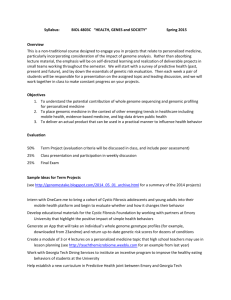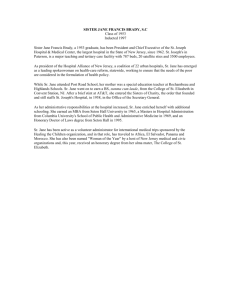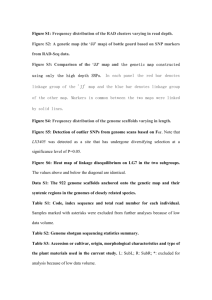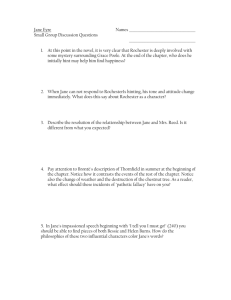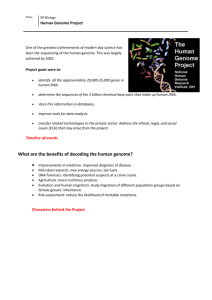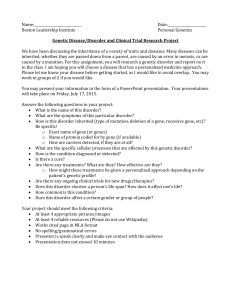4.1MB pdf
advertisement
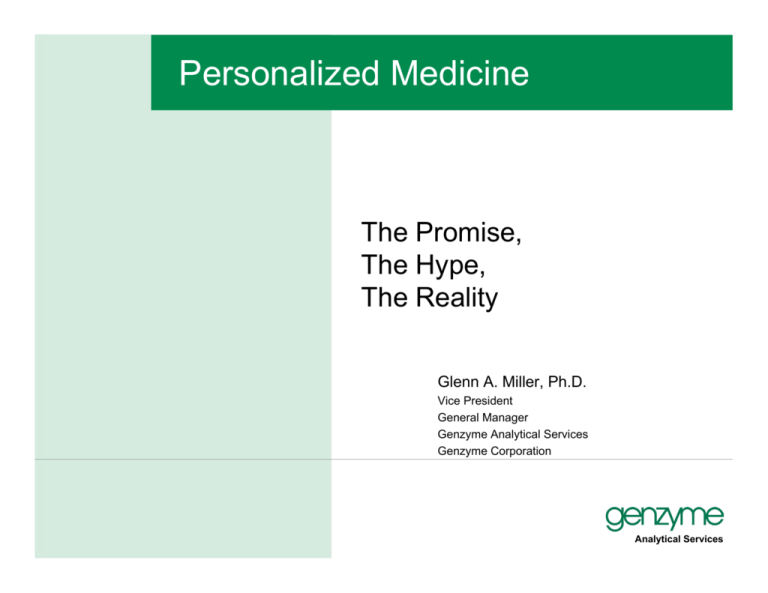
Personalized Medicine The Promise, The Hype, The Reality Glenn A. Miller, Ph.D. Vice President General Manager Genzyme Analytical Services Genzyme Corporation Analytical Services Need for Change: Strong case for personalized medicine US drug spending $250+B per year and growing fast 50% of drugs not efficacious as prescribed US diagnostics spending decreased since 1984 Adverse drug reactions 6th leading cause of death Building the Case for Personalized Medicine FDA interested in biomarkers and diagnostic algorithms Feb. 2005 PriceWaterhouseCoopers report titled Personalized Medicine: the Emerging Pharmacogenomics Revolution Nov. 2005 Thomas Weisel Partners report titled Beneficiaries of Personalized Medicine and Market Update Pharmacogenetics and the concept of individualized medicine published in The Pharmacogenomics Journal (Vol 6, Pg 16-21). Molecular Diagnostics and Personalized Medicine 2003, Drug & Market Development August 2003 2 Society can’t afford low efficacy Frequency of Absent or Incomplete Efficacy (%)1 Total Market Size Cost to the Health Care System of Ineffective Therapy Angiotensinconverting enzyme (ACE) inhibitors 10-30 $3.9B2 (2003) $390M-$1.2B Beta blockers 15-25 $ 2.3B2 (2003) $345M-575M Anti-depressants 20-50 $11.7B3 (2003) $2.3B-$5.8B Statins 30-70 $12.6B4 (2004) $3.8B-$8.8B Beta agonists 40-70 $1.4B5 (2004) $560M-$1B Drug Class 1 Ross JS & Ginsburg GS, Am J Clin Pathol 2003;119:26-36 August 1, 2005 3 Global Industry Analysts, October 10, 2004 4 Carnegie Research 5 Specialty Pharmaceutical Pulse, SG Cowen, October 2005 2 Datamonitor, 3 Patients don’t have time for trial and error Disease End stage renal disease Heart failure (male-female) Breast Cancer (node positive) Lung cancer (small cell-non small cell) 1 Levy, Perspectives U.S., 2004 Fourth Edition, DaVinci Healthcare Partners 2005 USRDS Annual Data Report 4 5 Year Survival 78% 38% 76-72% 41-55% 98% 79% 36-41% 6-13% et. al., Long-term trends in the incidence and survival from heart failure, NEJM, 2002; 347(18):1397-402 2 Cancer 3 1 Year Survival Spending more and testing less • Medicare & Medicaid represented 21% of the 2007 Federal Budget • Continued growth expected (from 2005-2015) • Medicare = 9% • Medicaid = 8% • Laboratory spending fell (Medicare Part B) • 40% reduction in real terms from 1984 to 2004 5 Saving Lives Positive Impact on Hematologic Cancers 60 Years Ago 50 Years Ago 40 Years Ago 5 year survival Leukemia or Lymphoma Chronic Leukemia Acute Leukemia Preleukemia Today ~ 0% “Disease of the Blood” Indolent Lymphoma Aggressive Lymphoma !38 Leukemia types identified: !51 Lymphomas identified: Acute myeloid leukemia (!12 types) Mature B-cell lymphomas (!14 types) Acute lymphoblastic leukemia (2 types) Mature T-cell lymphomas (15 types) Acute promyelocytic leukemia (2 types) Plasma cell neoplasm (3 types) Acute monocytic leukemia (2 types) Immature (precursor) lymphomas (2 types) Acute erythroid leukemia (2 types) Hodgkin’s lymphoma (5 types) Immunodeficiency associated lymphomas (!5 types) Acute megakaryoblastic leukemia Other hematolymphoid neoplasms (!7 types) Acute myelomonocytic leukemia (2 types) Chronic myeloid leukemia Chronic myeloproliferative disorders (5 types) Myelodysplastic syndromes (6 types) Mixed myeloproliferative/myelodysplastic syndromes (3 types) 70% Ries LAG, Eisner MP, Kosary CL, Hankey BF, Miller BA, Clegg L, Mariotto A, Feuer EJ, Edwards BK (eds). SEER Cancer Statistics Review, 1975-2002, National Cancer Institute. 6 Bethesda, MD, http://seer.cancer.gov/csr/1975_2002/, based on Nov 2004 SEER data submission, posted to the SEER web site 2005. Prescription Medication Compliance Up to 50 % of patients do not take medications as prescribed Take medications as prescribed, 54% Stop taking medicine before it runs out, 22% Don't fill prescription, 12% Fill prescription but don’t take medicine, 12% 7 Source: www.americanheart.org Prescription Medication Compliance ! 10 % hospitalizations due to noncompliance ! 3.5 million patients ! Average hospital stay in 4.2 days due to noncompliance ! $15.2 billion cost ! 23 % of all nursing home admissions are due to noncompliance ! 380,000 patients ! $31.3 billion cost ! Noncompliance causes 125,000 deaths annual in the United States 8 Prescription Medication Compliance ! Factors Believed To Affect Compliance ! ! ! ! ! Patient knowledge Prior compliance behavior Ability to integrate into daily life / complexity of drug regimen Health beliefs and perceptions of benefits of treatment Social support, including practitioner relationship ! Factors Believed NOT To Affect Compliance ! Age, race, gender, income or education ! Patient intelligence ! Actual seriousness of disease or efficacy of the treatment 9 Personalized Medicine: The Future " FDA # Insist on diagnostic links that decrease side effects and improve efficacy with new therapies " Payors # Demand diagnostics to manage drug costs and improve patient care # CMS approval for targeted drugs depends on efficacy " Pharmaceutical Companies # Reduce drug failures in late clinical trials (and on the market) # Increase efficacy - show real value of drug " Patients # Improved care – more effective treatments with fewer side effects 10 Personalized Medicine: The Future " Diagnostics – Turn the Hype into Reality # 3% of the costs – 70% of the medical decisions # Make new drugs work # More than 50% of cancer drugs in development today are targeted and will need diagnostics to determine use # Save money # Reduce ineffective use of drugs and treatments # Save lives # Give physicians information to better use options available # Deliver on the promise # The right drug to the right patient at the right time 11 The Key to Personalized Medicine: Diagnostics Current - Diagnostic Testing Identify disease state with high level of resolution Emerging Today - Prognostic Testing Clarify probable outcomes Monitor disease Emerging Tomorrow - Predictive Testing Predict response to therapeutics Screen for adverse outcomes Define risks for development of common diseases 12 Genetic Testing Market Number of Available Tests* * Excludes genetic tests for hereditary cancers and infectious diseases 13 Source: GeneTests.org The Department of Human Genome Impact: Pharmaceutical Division ! Like drinking from a fire hose ! Lots of volume ! Huge amounts of novel data ! Everyone gets wet ! New discoveries affect every facet of disease management ! Not everyone’s thirst is quenched ! Genomics is not the answer to every question ! Trying to drink too fast can hurt ! A disorganized approach to the use of genomics can waste money and time ! A little thought on how to capture and use the water later can be helpful ! Incorporating genomic information early in development can lead to benefits in later clinical trials 14 Standing on the Shoulders of Giants "We wish to suggest a structure for the salt of deoxyribose nucleic acid (D.N.A.). This structure has novel features which are of considerable biological interest... ...It has not escaped our notice that the specific pairing we have postulated immediately suggests a possible copying mechanism for the genetic material.“ -James Watson and Francis Crick 15 Nature 171:737, 1953 Anatomy of the Human Vesalius 1543 Harvey 1628 !" #$%&'()%*+ #,-$-#. / 0 1 . . / 2 + #. 3 3 4 16 Morgagni 1761 Anatomy of the Human Genome 1950’s 1960’s 1980’s to Today The Future? 17 Human Genome Project We’ve come a long way with a long way to go akdjfhqlweuehlkjwekbalsdkfiuk ajsdasdclinicasdflkjheuallyadfh jhojwerusejhafyyqrewfuljbadbk fbkdinforadfjbkjdkjbmationjhas djkjhskdjhkljhlekrjhwkejrbkbjbf Clinically useful information “Celera’s genome sequence will be a truth serum for the field” J. Craig Venter, NY Times 2/13/01 “They have to say something about a worthless database” William A. Haseltine, NY Times 2/13/01 18 Why This Matters ! Benefits patients ! Improved diagnostics (Dx) ! Targeted therapeutics (Rx) ! Individualized care will become a reality ! Best treatment for the individual patient ! Actual “evidence” for Evidence Based Medicine ! The public expects this to happen ! A need to manage expectations ! Understand and anticipate scientific advances and educate the public about the impact 19 Genetics is news 1990 1994 2001 “targeting” 20 The Prediction “Prediction is very difficult, especially about the future” Niels Bohr ! Someday your genome will be on a credit card-sized device…or iPod® ! “Dr. Will Gilbert at UNH is already carrying around the latest version of several genomes on his iPod” Scarlet Pruitt, IDG News Service Monday, January 20, 2003 Is this the correct prediction? Why would this be desirable? What might the future really look like? 21 Challenges to Implementation ! Technology ! Information ! Cost ! Need ! Desire 22 Technology ! Entire human genome occupies about 1Gb of storage when compressed. ! 1Gb USB drives available for less than $20 ! Future storage advances will easily solve any portable storage issue ! With broadband access may not even need to carry information with you This is an absolutely achievable goal ! Whole genome sequencing on a populationwide scale is a significant technical leap away This goal will take significant effort 23 Information ! What kind of information is needed? ! The task of sorting through the Human Genome Project ! Over 3 billion bases ! 25,000+ genes ! Over 40% of which have no known function ! Millions of variants ! Most discoveries will be diagnostic before they are therapeutic ! Problem of knowledge with no recourse ! Lack of understanding of which sequences and sequence changes are important 24 Cost ! Assume the sequencing cost is $1000 ! Does not include shipping, labor, results analysis, reporting and markup ! 4 million births annually ! $4 billion/year in sequencing costs ! Assume only those with a certain level of education ! High school & college grads = $2.2 billion/yr ! Postgraduate = $1 billion/yr ! Roughly 88% have health insurance of some kind ! ~$2.8 billion to health insurance plans/year ! This does not include the bolus of sequencing for the existing population ! Estimated market size for all of genetic testing in 2004 is $600 million (Frost & Sullivan) National Vital Statistics Reports Final data for 2000 Centers for Disease Control National Center for Health Statistics 25 Need (the So What?!? test) ! To what use will this information be put? ! For centuries medicine has been geared towards problem solving ! Information is requested at the time of illness not gathered in advance ! Trial and error medicine predominates ! FDA approves based on safety first, efficacy second 26 Desire ! Do we really want to know this information? ! This is not the philosophical “All and ever present good” ! Many individuals prefer not to know ! ~50% of women seeking amniocentesis decide otherwise after non-directive genetic counseling ! ~57-84% of at risk individuals for Huntington’s Disease indicated interest in test before it was available. Less than 20% (2-16%) actually took the test after it was launched ! Fear of being unable to undo the knowledge ! Loss of insurance, job ! Survivor guilt Maat-Kievit et al. J Neurol Neurosurg Psychiatry 2000;69:579-583 27 Educational Challenges ! Educating healthcare workers ! Genetics as a part of medical education is increasing but remains a low emphasis subject for the current student ! The current healthcare workforce has had minimal to no genetics education ! For the practicing physician >45 years old most of the era of genetic discovery has come since they graduated medical school. ! May take a generational change to fully incorporate these medical practice advances 28 I want that new test! vs. Why should I use/pay for that? The Yin/Yang of Providers, Payors & Employers ! Inability to fully evaluate tests ! Large number of areas to cover ! Current clinical responsibilities leave little time for study ! Utilization management and cost containment are primary drivers ! Employers focus on health care costs ! Certain that tests costs will rise with no real benefit to them ! Employees want the tests covered ! Providers and payors are bombarded by requests for new tests ! Effect of plan members with access to Internet, NY Times, USA Today, local papers, TV, radio, Bill Nye the Science Guy 29 Payors and the information glut It is all a matter of individual perspective Questions and comments from managed care ! “What about privacy concerns when everyone’s genome is on a credit card sized device?” ! “They can clone sheep, what about humans? What do I need to plan for in my budget?” ! “Genetics is nothing, Bariatric surgery is the most over hyped clinical event in 25 years! It has dramatically hit my budget.” ! “You are wrong if you think you are going to price a test based on the amount of money you are saving me divided by the patients tested.” ! “Why should I care, I just deny everything anyway!” ! “Why don’t we just wait until the proteomics tests come to market?” ! “Genetic testing is just for rare diseases that don’t occur in the members of this plan.” 30 The providers are just as perplexed ! “Is DNA really found in every cell?” ! “The last genetics I took was in medical school 30 years ago!” ! “Just tell me which box to check off and what the rights codes are.” ! “They found the gene for disease X. My (patient, mother, husband, child…) has disease X. Where can I get the (test, therapy, cure…)” ! “I keep hearing about these microarray things. What is the big deal?” ! “Can you explain to my patient (and me) what the genetic information means?” ! “My professional organization has established this as standard of care. Now what do I do?” 31 The Doe Family Janet John Jane Jackie Jake 32 Joseph Jane Diagnostic Impact ! Born in 1942 ! Jane’s mother had no genetic testing offered to her during her pregnancy ! 1980 gives birth to daughter Jackie ! Offered amniocentesis, karyotype analysis & biochemical genetic analysis ! Standard of care determined by age due to invasiveness of procedure ! 2010 Jackie gives birth to Jake ! First trimester screening routine ! Genetic analysis done via blood sample test of Fetal DNA in maternal circulation, pre & post test genetic counseling ! Minimal invasiveness means no age cutoff; Information available for all pregnancies 33 Jane Pharmacogenetics ! 2000 ! 2007 ! Jane is diagnosed with depression ! One of ~20 million individuals diagnosed each year ! Placed on standard dose tricyclic anti-depressant ! Shows signs of confusion ! Difficulty concentrating ! Physician interprets as further signs of depression, incr. dose ! Agitation ! Nausea and vomiting ! Jane switched to alternative TCA 34 ! Jane is diagnosed with depression ! CYP450 genotype determined ! Deficient in CYP2D6 ! Placed on SSRI successfully The genotype also explains why Jane does not respond to codeine based analgesics Joseph Pharmacogenetics -: ;" 789 " ,56" ! 2002 ! Joseph is diagnosed with hypertension and placed on his first "-blocker ! Experiences wheezing and shortness of breath ! Hypertension is not adequately resolved ! Joseph is switched to another "blocker ! While his hypertension is eased Joseph experiences dizziness at the effective dose ! Joseph speaks to a friend, sees his physician as a new patient ! Receives his third different "blocker ! Hypertension controlled without significant side effects 35 ! 2009 ! Joseph is diagnosed with hypertension ! Physician orders a CYP450 genotype ! Test identifies Joseph as a poor metabolizer for a class of drugs requiring CYP2D6 ! Physician uses this information to select a "-blocker not metabolized in this manner ! Joseph’s hypertension is controlled without significant side effects. All in one visit and with one drug Jane & Janet Prognosis & Treatment Impact ! Jane, 2000 ! Undergoes colonoscopy ! Found to have a Dukes A adenocarcinoma ! Successful surgical resection, unremarkable hospital stay, no further Rx ! Returns at regular intervals for follow-up colonoscopy ! Found to have widespread metastasis at 5yrs. post resection Both sisters receive genetic counseling concerning colon cancer risk and options 36 ! Janet, 2009 ! Molecular test to detect colon cancer ! Undergoes colonoscopy ! Found to have a Dukes A adenocarcinoma (15% metastasize) ! Learns from the Internet about a molecular test for cancer spread ! Successful surgical resection & hospital stay ! Molecular profiling determines her tumor has high metastatic potential ! Treated with 5-FU ! Disease free at 5yrs. Human Genome Project Impact Genetic Counseling ! Responsible approach based on evidence-based practice guidelines ! Enhances informed decision-making & consent ! 45%-55% of patients accept amnios after genetic counseling ! Improves health care coordination and supports health plan goals ! Right test for the right patient at the right time 37 Janet Jane John Joseph Jackie Jake ! Better prenatal testing & cancer diagnostics ! The right drug to the right patient at the right dose ! Novel targeted treatments ! Reduced adverse events Boston Metropolitan Area Janet Transition from age restricted testing to testing for all Testing optimizes Rx selection for anti-depression/anti-anxiety 38 John Jane Jackie Jake Joseph Prenatal Testing Transition From Age-Restricted Testing to Testing For All 39 Pharmacogenetics Testing Optimizes Rx Selection for Anti-Depression/Anti-Anxiety 40 Boston Metropolitan Area Janet John Jane Jackie Drug class selection for best results Jake 41 Joseph Pharmacogenetics Drug Class Selection for Best Results 42 Boston Metropolitan Area Janet John Jane Jackie Targeted therapies and diagnostics for cancer Jake 43 Joseph Targeted Therapy and Molecular Profiling Targeted Therapies and Diagnostics For Cancer 44 Boston Metropolitan Area Janet John Jane Jackie The real impact of the Human Genome Project Jake 45 Joseph Boston Metropolitan Area The Real Impact Of The Human Genome Project 46 Summary ! The use of genetics in drug development is increasing as a result of a: ! ! ! ! Greater understanding of disease mechanisms Response to competition Recognition that approval times can be shortened Recognition that regulatory agencies are now expecting this kind of data in support of an application ! The healthcare community is moving to adopt targeted therapy ! Better efficacy ! Safer treatments ! Better outcomes ! The future of Personalized Medicine is secure ! Now begun, there are too many benefits to the public to prevent its adoption 47 Two closing thoughts “The danger with the information revolution is that we will overestimate the short term implications, and underestimate the long term impact. “ Bill Gates Much the same can be said of the genomic revolution “Even if you are on the right track, you will get run over if you just sit there.” Mark Twain 48
